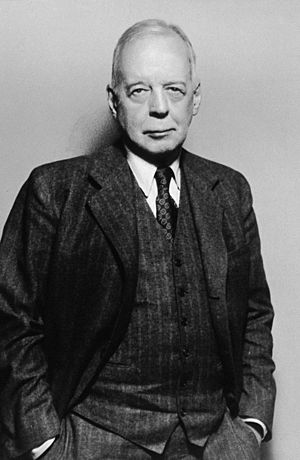Alfred Newton Richards facts for kids
Quick facts for kids
Alfred Newton Richards
|
|
|---|---|

Alfred Newton Richards in 1954
|
|
| Born | March 22, 1876 |
| Died | March 24, 1966 (aged 90) |
| Alma mater | Yale University |
| Awards | Fellow of the Royal Society |
| Scientific career | |
| Institutions | University of Pennsylvania |
| Influenced | Leonard Ernest Bayliss |
Alfred Newton Richards (March 22, 1876 – March 24, 1966) was an important American scientist. He studied how medicines affect the body, a field called pharmacology. Richards is famous for helping to create a special way to study how kidneys work. This method, called renal micropuncture, was developed with another scientist named Wearn in 1924. It helped doctors understand kidneys much better.
Contents
A Life in Science
Alfred Richards was born in Stamford, New York. His father was Rev. Leonard E. Richards. Alfred went to school at the Stamford Seminary and Union Free School. Later, he studied at Yale University.
Leading Medical Research
Richards led the pharmacology department at the University of Pennsylvania School of Medicine for many years. He was in charge from 1910 to 1946. He also became the university's vice president for medical affairs from 1939 to 1948.
In 1941, during World War II, U.S. President Franklin Delano Roosevelt asked Richards to lead the Committee on Medical Research. This committee helped organize important medical studies during the war. After five years, in 1946, Richards became the president of the United States National Academy of Sciences. He held this important role until 1950.
In 1948, President Harry Truman also asked Richards to join a special group. This group looked at how the government's medical services were organized. Richards also became a director at Merck & Co., a big medicine company. He had been a consultant for them since 1931.
Family Life
Alfred Richards married Lillian L. Woody in 1908.
His Impact and Legacy
Richards' special method for studying how kidneys work was a huge step forward in understanding animal bodies. It helped scientists learn a lot about how our kidneys function.
The Richards Medical Research Laboratories building at the University of Pennsylvania is named after him. This building is famous for its design by the architect Louis Kahn.
Awards and Special Honors
Alfred Richards received many awards and honors for his important work. These include:
- Abraham Flexner Award
- Gerhard Medal
- Kober Medal
- John Scott Medal
- Gold Medal of the New York Academy of Medicine
- Keyes Medal
- Philadelphia Bok Award
- Procter Award
- Guggenheim Cup Award
- Lasker Award
- Kovalenko Medal
He was also recognized by important scientific groups:
- Foreign Fellow of the Royal Society of London
- Honorary Fellow of the Royal Society of Edinburgh
- Member of the American Academy of Arts and Sciences
- Member of the United States National Academy of Sciences
- Member of the American Philosophical Society
Honorary Degrees
Richards also received many special degrees from universities, even though he didn't study there for them. These are called honorary degrees.
- University of Pennsylvania
- Western Reserve University
- Yale University
- Harvard University
- Columbia University
- Williams College
- Princeton University
- New York University
- University of Pennsylvania
- University of Louvain
 | Charles R. Drew |
 | Benjamin Banneker |
 | Jane C. Wright |
 | Roger Arliner Young |

